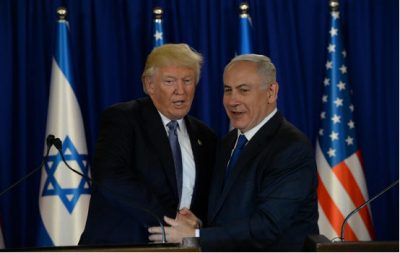Done Deal: How the Peace Process Sold Out the Palestinians
Details of Trump's 'deal of the century' are finally set to be unveiled. But US support for Israel has already changed the reality on the ground

In November 2016, fresh off his electoral win, US President-elect Donald Trump boasted of his intention to end the Israel-Palestine conflict by striking what he called the “ultimate deal”.
Calling it “the war that never ends,” Trump told the Wall Street Journal: “As a deal maker, I’d like to do … the deal that can’t be made. And do it for humanity’s sake.”
A billionaire property tycoon and reality TV star known for his wheeling and dealing in the New York City real estate market, this was not the first time that Trump had framed the cause of peacemaking and diplomacy in terms of a business transaction.
Asked in March 2016 during his election campaign what the best deal of his life had been, he said it had been the creation of 6,000 housing units on the West Side of Manhattan.
His interviewer then asked him what would be the best deal he could make as president.
“Peace all over the world would be the best deal. And I think I would know how to do it better than anybody else, but peace all over the world,” came the modest reply.
Once in office, Trump tasked another property speculator, his son-in-law Jared Kushner, with delivering that deal, by now widely dubbed the “deal of the century”.
‘Slap of the century’
It has since turned into the most controversial and scandal-plagued peace initiative in the long and sad history of Middle East peace initiatives.
In the process of attempts to get it off the ground, the Palestinian leadership has refused to even open the file, let alone get involved in negotiations, with PA President Mahmoud Abbas calling it the “slap of the century“.
Trump has meanwhile closed the Palestine Liberation Organisation’s mission in Washington; he has recognised Jerusalem as the capital of Israel, and the occupied Golan Heights as Israeli territory.
In addition, he has cut funds to the United Nations relief agency UNRWA, which runs schools and medical facilities for millions of Palestinian refugees across the region, as well as providing their main source of employment.
And he has unilaterally called for a change in the definition of a refugee, deciding that all but 500,000 of an estimated 5.5 million Palestinian refugees should be stripped of their status.
All this in an attempt to “break and remake” the Middle East.
The deal has divided analysts. Some believe it is designed to fail. Others believe it does not matter whether it is published or not – it is already being enacted on the ground, with the process of “peace-making” itself now only providing cover for the US administration’s one-sided support for Israel.
Middle East Eye examines this thesis in a series of articles originally published in June 2019 which we have grouped together under the heading “Done Deal” – recognition that whatever is proposed, the reality on the ground has already changed in fundamental ways and continues to do so regardless of what is said in the halls of power in Washington or elsewhere.
In the first of these, we look at how reality is changing to prepare for Israel’s permanent annexation of large parts of the West Bank.
In other articles, we consider how the status of refugees is changing; how access to the Old City in Jerusalem has been restricted; how the stranglehold over Gaza has been progressively tightened; and, finally, how financial incentives and threats, with large sums of money dangled to entice Palestinians into agreeing to an inequitable deal or the withdrawal of funds to compel them to do so, are nothing new.
*
Note to readers: please click the share buttons above or below. Forward this article to your email lists. Crosspost on your blog site, internet forums. etc.
Featured image is from Israeli Ministry of Foreign Affairs/Flickr

